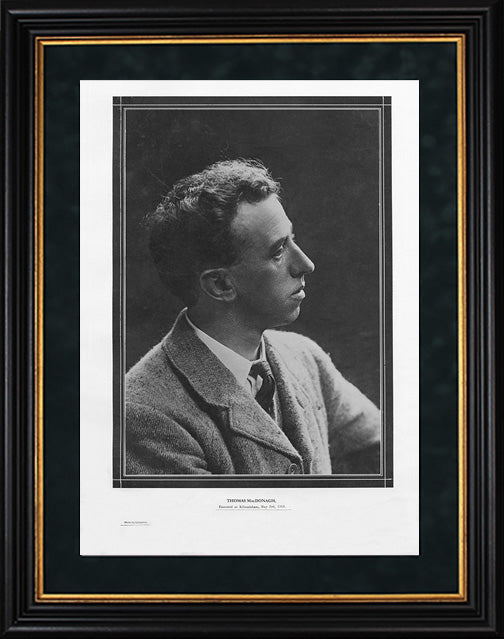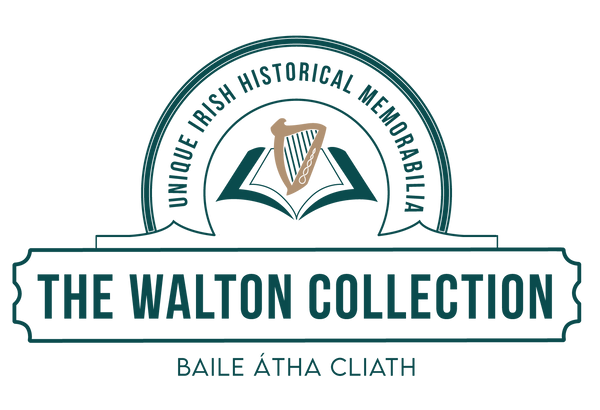The Walton Collection
Thomas MacDonagh - 1916 Poster
Thomas MacDonagh - 1916 Poster
Couldn't load pickup availability
Thomas MacDonagh 1916 commemorative poster recreated from a photo in The Walton Collection.
Thomas MacDonagh was born on the 1st February and was an Irish political activist, poet, playwright, and revolutionary leader. He was heavily involved in the preparations for the Rising and a signatory of the Proclamation of the Irish Republic, in addition to being Commandant of the 2nd Battalion, Dublin Brigade, of the Irish Volunteers, which occupied Jacob's biscuit factory. He was court-martialled and executed for his role in the Rising.
MacDonagh was assistant headmaster at St. Enda's School, Scoil Éanna, as well as holding a lecturer post in English at UCD. He was a member of the Gaelic League, where he became a close friend of both Patrick Pearse and Eoin MacNeill. Along with MacNeill and Pearse he was a founding member of the Irish Volunteers . He wrote poetry and his play, When the Dawn is Come, was produced by the Abbey Theatre in 1908. His other plays Metempsychosis, 1912 and Pagans, 1915 were both produced by the Irish Theatre Company.
He was born Cloughjordan, County Tipperary, to a schoolmaster,Joseph MacDonagh and his wife Mary Parker. As a child his family home was filled with music, poetry and learning and he was instilled with a passion for both English and Irish culture from a young age. Among his brothers were future Sinn Féin politician, Joseph, and film director John. MacDonagh attended Rockwell College and soon after leaving he published his first book of poems, Through the Ivory Gate, in 1902. He also taught in St Kieran's College in Kilkenny and from 1903 he was employed as a professor of French, English and Latin at St. Colman's College, Fermoy, County Cork, where he also established a branch of the Gaelic League.
While in Fermoy, MacDonagh was one of the founders of ASTI, the secondary teachers trade union which was formed in the Fermoy College in 1908. His friendship with Pearse and his love of the Irish language led him to join the staff of Pearse's bilingual St. Enda's School upon its establishment in 1908. MacDonagh was essential to the school's early success, and following his marriage he took the position of lecturer in English at the National University, while continuing to work at St Enda's. MacDonagh was devoted to the Irish language, and in 1910 he became tutor to a younger member of the Gaelic League and poet, Joseph Plunkett, later becoming close friends.
On 3 January 1912 he married Muriel Gifford (a member of the Church of Ireland) and their son, Donagh, was born that November, and their daughter, Barbara, in March 1915. Muriel's sister, Grace Gifford, was to marry Joseph Plunkett hours before his execution in 1916.
MacDonagh was a member of the Irish Women's Franchise League. He supported the strikers during the Dublin lockout and was a member of the "Industrial Peace Committee" alongside Joseph Plunkett, whose stated aim was to achieve a fair outcome to the dispute. In 1913 both MacDonagh and Plunkett attended the inaugural meeting of the Irish Volunteers and joined its Provisional Committee. MacDonagh was later appointed Commandant of Dublin's 2nd Battalion and eventually made commandant of the entire Dublin Brigade.
Initially a constitutionalist MacDonagh had developed strong republican beliefs, joining the IRB, probably during the summer of 1915. Around this time Tom Clarke asked him to plan the funeral of Jeremiah O'Donovan Rossa, which was a resounding propaganda success.
Though credited as one of the Easter Rising's seven leaders, MacDonagh was a late addition to that group where his close ties to Pearse and Plunkett may have helped, in addition to his position as commandant of the Dublin Brigade .
Despite MacDonagh's rank and the fact that he commanded one of the strongest battalions, they saw little fighting, as the British Army avoided the factory as they established positions in central Dublin. MacDonagh received the order to surrender on 30 April, though his entire battalion was fully prepared to continue the engagement.
Following the surrender, MacDonagh was court martialled, and executed by firing squad on 3 May 1916, aged thirty-eight. He was the 3rd signatory of the Proclamation to be shot. It is said that as he was taken from his cell to be executed he whistled.
The text below the image simply states" THOMAS MacDONAGH, Executed at Kilmainham, 3rd May,1916"
Produced and created from a high-quality Lafayette photograph in the style of the other 1916 leader's posters this stunning image is printed210 gsm satin art paper, beautifully mounted on a mottled green suede background and set behind glass in a handmade, aged dark mahogany finish frame with a gold gilt sightline.


